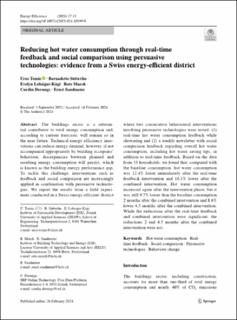Please use this identifier to cite or link to this item:
https://doi.org/10.21256/zhaw-30114| Publication type: | Article in scientific journal |
| Type of review: | Peer review (publication) |
| Title: | Reducing hot water consumption through real-time feedback and social comparison using persuasive technologies : evidence from a Swiss energy-efficient district |
| Authors: | Tomic, Uros Sütterlin, Bernadette Lobsiger-Kägi, Evelyn Marek, Reto Derungs, Curdin Sandmeier, Ernst |
| et. al: | No |
| DOI: | 10.1007/s12053-024-10199-9 10.21256/zhaw-30114 |
| Published in: | Energy Efficiency |
| Volume(Issue): | 17 |
| Issue: | 15 |
| Issue Date: | 26-Feb-2024 |
| Publisher / Ed. Institution: | Springer |
| ISSN: | 1570-646X 1570-6478 |
| Language: | English |
| Subjects: | Hot water consumption; Real-time feedback; Social comparison; Persuasive technology; Behaviour change |
| Subject (DDC): | 333.79: Energy |
| Abstract: | The buildings sector is a substantial contributor to total energy consumption and, according to current forecasts, will remain so in the near future. Technical energy efficiency innovations can reduce energy demand; however, if not accompanied appropriately by building occupants’ behaviour, discrepancies between planned and resulting energy consumption will persist, which is known as the building energy performance gap. To tackle this challenge, interventions such as feedback and social comparison are increasingly applied in combination with persuasive technologies. We report the results from a field experiment conducted in a Swiss energy-efficient district where two consecutive behavioural interventions involving persuasive technologies were tested: (1) real-time hot water consumption feedback while showering and (2) a weekly newsletter with social comparison feedback regarding overall hot water consumption, including hot water saving tips, in addition to real-time feedback. Based on the data from 33 households, we found that, compared with the baseline consumption, hot water consumption was 12.4% lower immediately after the real-time feedback intervention and 16.1% lower after the combined intervention. Hot water consumption increased again after the intervention phase, but it was still 9.7% lower than the baseline consumption 2 months after the combined intervention and 8.6% lower 4.5 months after the combined intervention. While the reductions after the real-time feedback and combined intervention were significant, the reductions 2 and 4.5 months after the combined intervention were not. |
| Further description: | Erworben im Rahmen der Schweizer Nationallizenzen (http://www.nationallizenzen.ch) |
| URI: | https://digitalcollection.zhaw.ch/handle/11475/30114 |
| Fulltext version: | Published version |
| License (according to publishing contract): | CC BY 4.0: Attribution 4.0 International |
| Departement: | School of Engineering |
| Organisational Unit: | Institute of Sustainable Development (INE) |
| Published as part of the ZHAW project: | 2000-Watt-Gesellschaft leben: Reduktion des Energieverbrauchs durch Verhaltensänderungen |
| Appears in collections: | Publikationen School of Engineering |
Files in This Item:
| File | Description | Size | Format | |
|---|---|---|---|---|
| 2024_Tomic-etal_Reducing-hot-water-consumption.pdf | 971.42 kB | Adobe PDF |  View/Open |
Show full item record
Tomic, U., Sütterlin, B., Lobsiger-Kägi, E., Marek, R., Derungs, C., & Sandmeier, E. (2024). Reducing hot water consumption through real-time feedback and social comparison using persuasive technologies : evidence from a Swiss energy-efficient district. Energy Efficiency, 17(15). https://doi.org/10.1007/s12053-024-10199-9
Tomic, U. et al. (2024) ‘Reducing hot water consumption through real-time feedback and social comparison using persuasive technologies : evidence from a Swiss energy-efficient district’, Energy Efficiency, 17(15). Available at: https://doi.org/10.1007/s12053-024-10199-9.
U. Tomic, B. Sütterlin, E. Lobsiger-Kägi, R. Marek, C. Derungs, and E. Sandmeier, “Reducing hot water consumption through real-time feedback and social comparison using persuasive technologies : evidence from a Swiss energy-efficient district,” Energy Efficiency, vol. 17, no. 15, Feb. 2024, doi: 10.1007/s12053-024-10199-9.
TOMIC, Uros, Bernadette SÜTTERLIN, Evelyn LOBSIGER-KÄGI, Reto MAREK, Curdin DERUNGS und Ernst SANDMEIER, 2024. Reducing hot water consumption through real-time feedback and social comparison using persuasive technologies : evidence from a Swiss energy-efficient district. Energy Efficiency. 26 Februar 2024. Bd. 17, Nr. 15. DOI 10.1007/s12053-024-10199-9
Tomic, Uros, Bernadette Sütterlin, Evelyn Lobsiger-Kägi, Reto Marek, Curdin Derungs, and Ernst Sandmeier. 2024. “Reducing Hot Water Consumption through Real-Time Feedback and Social Comparison Using Persuasive Technologies : Evidence from a Swiss Energy-Efficient District.” Energy Efficiency 17 (15). https://doi.org/10.1007/s12053-024-10199-9.
Tomic, Uros, et al. “Reducing Hot Water Consumption through Real-Time Feedback and Social Comparison Using Persuasive Technologies : Evidence from a Swiss Energy-Efficient District.” Energy Efficiency, vol. 17, no. 15, Feb. 2024, https://doi.org/10.1007/s12053-024-10199-9.
Items in DSpace are protected by copyright, with all rights reserved, unless otherwise indicated.